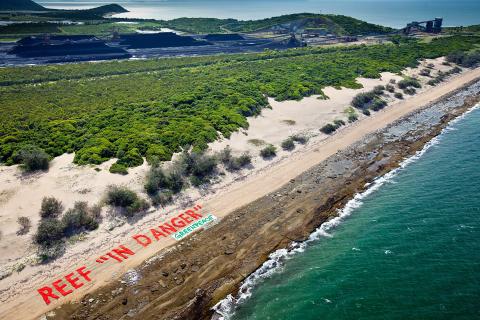Australia’s iconic Great Barrier Reef is under imminent threat from industrial development and may be considered for listing as a world heritage site “in danger” within the next year, a UN report said last week.
Citing the findings of a mission to the world’s largest living structure in March, the UN Educational, Cultural and Scientific Organization (UNESCO) recommended that: “In the absence of substantial progress,” its World Heritage Committee would consider such a listing in February next year.
Key pressures on the reef include coastal development, ports, liquefied natural gas facilities, extreme weather, grounding of ships and poor water quality, UNESCO said.

Photo: AFP
The reef’s outstanding universal value “is threatened and decisive action is required to secure its long-term conservation,” it said.
Australian organizations managing the reef have adopted high-quality practices, UNESCO said, but noted that “despite management successes there has been a continuing decline in the quality of some parts” of the reef.
Australia’s northeastern state of Queensland, where the reef is located, is one of the country’s fastest-developing regions.
Onshore are economically important coal mining operations, while the reef itself is a major tourist attraction.
In recent years, critics have pointed to the dangers posed to the reef by industrial development, particularly since 2010 when a Chinese coal carrier rammed into part of the reef.
In its report, UNESCO specifically mentioned plans for liquefied natural gas facilities at Curtis Island, and ongoing development of the key coal port of Gladstone.
Future port infrastructure plans should be limited to “existing and long-established” ports in the region, it said.
UNESCO called for the setting of clear, legal targets for the reef’s condition, and said the high level of approvals for planned development in recent years was a concern.
“Considering the high rate of approvals over the past 12 years, this unprecedented scale of development affecting or potentially affecting the property poses serious concerns over its long-term conservation,” it said.
The politically influential Greens, who support Australian Prime Minister Julia Gillard’s minority government, responded to the report by calling for Australia to reduce its dependence on coal.
Australian Environment Minister Tony Burke acknowledged that climate change and coastal development posed ongoing threats to the reef, but said the report contained no surprises.
“The UNESCO mission in March acknowledged that our management of the Great Barrier Reef World Heritage Area is still considered to be best practice,” Burke said in a statement.
The World Heritage Committee will discuss the report when it meets in St Petersburg, Russia, later this month.

‘TERRORIST ATTACK’: The convoy of Brigadier General Hamdi Shukri resulted in the ‘martyrdom of five of our armed forces,’ the Presidential Leadership Council said A blast targeting the convoy of a Saudi Arabian-backed armed group killed five in Yemen’s southern city of Aden and injured the commander of the government-allied unit, officials said on Wednesday. “The treacherous terrorist attack targeting the convoy of Brigadier General Hamdi Shukri, commander of the Second Giants Brigade, resulted in the martyrdom of five of our armed forces heroes and the injury of three others,” Yemen’s Saudi Arabia-backed Presidential Leadership Council said in a statement published by Yemeni news agency Saba. A security source told reporters that a car bomb on the side of the road in the Ja’awla area in

PRECARIOUS RELATIONS: Commentators in Saudi Arabia accuse the UAE of growing too bold, backing forces at odds with Saudi interests in various conflicts A Saudi Arabian media campaign targeting the United Arab Emirates (UAE) has deepened the Gulf’s worst row in years, stoking fears of a damaging fall-out in the financial heart of the Middle East. Fiery accusations of rights abuses and betrayal have circulated for weeks in state-run and social media after a brief conflict in Yemen, where Saudi airstrikes quelled an offensive by UAE-backed separatists. The United Arab Emirates is “investing in chaos and supporting secessionists” from Libya to Yemen and the Horn of Africa, Saudi Arabia’s al-Ekhbariya TV charged in a report this week. Such invective has been unheard of

‘SHOCK TACTIC’: The dismissal of Yang mirrors past cases such as Jang Song-thaek, Kim’s uncle, who was executed after being accused of plotting to overthrow his nephew North Korean leader Kim Jong-un has fired his vice premier, compared him to a goat and railed against “incompetent” officials, state media reported yesterday, in a rare and very public broadside against apparatchiks at the opening of a critical factory. Vice Premier Yang Sung-ho was sacked “on the spot,” the state-run Korean Central News Agency said, in a speech in which Kim attacked “irresponsible, rude and incompetent leading officials.” “Please, comrade vice premier, resign by yourself when you can do it on your own before it is too late,” Kim reportedly said. “He is ineligible for an important duty. Put simply, it was

US President Donald Trump on Saturday warned Canada that if it concludes a trade deal with China, he would impose a 100 percent tariff on all goods coming over the border. Relations between the US and its northern neighbor have been rocky since Trump returned to the White House a year ago, with spats over trade and Canadian Prime Minister Mark Carney decrying a “rupture” in the US-led global order. During a visit to Beijing earlier this month, Carney hailed a “new strategic partnership” with China that resulted in a “preliminary, but landmark trade agreement” to reduce tariffs — but